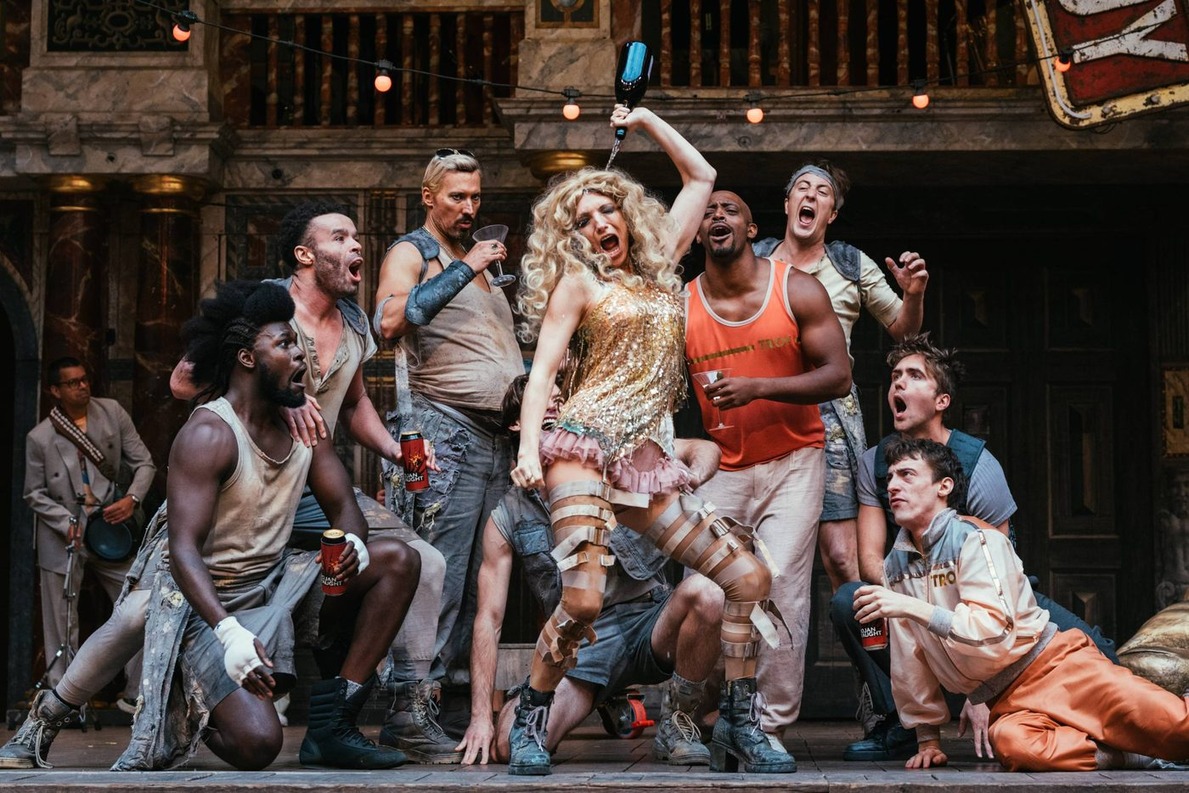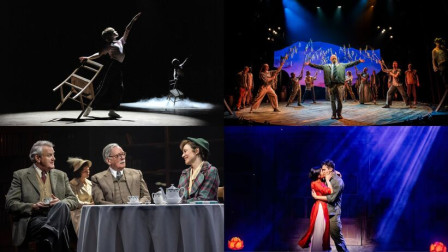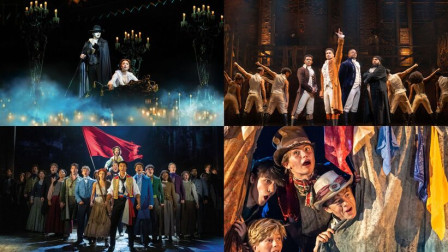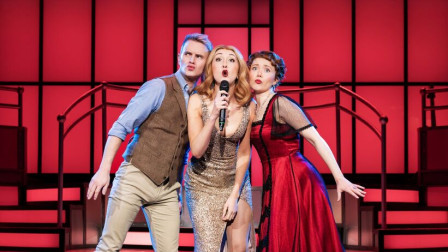Review: TROILUS AND CRESSIDA at Shakespeare's Globe
Troilus and Cressida is one of Shakespeare’s ‘problem plays’ - not quite tragedy, not quite comedy, and notoriously frustrating for critics and historians. That means it’s one of the more rarely performed (and challenging to perform) plays of his repertoire. In his Globe debut, Owen Horsley takes a decidedly cynical, satirical, and blackly comedic stab at this ancient story.
 The cast of TROILUS AND CRESSIDA. Photo by Helen Murray.
The cast of TROILUS AND CRESSIDA. Photo by Helen Murray.
As in Homer’s Iliad, the play drops us into the middle of the Trojan War, with the Greek army laying siege to the city of Troy. The Trojan prince Troilus has fallen passionately in love, and the bawdy Pandarus is scheming to help him win over the lady Cressida. Outside the city walls, the Greek generals and princes are also scheming, to lure the bull-headed Achilles out of his self-imposed exile so he agrees to fight Prince Hector, Troy’s greatest warrior. This epic world of heroes and battles and doomed love is a familiar refrain to modern audiences, as it would have been to Shakespeare’s, with its tragic ending a foregone conclusion.
Ancient ruins create a decidedly post-apocalyptic atmosphere, the signs of a world in its dying throes, while everything else about the staging is pointedly modern. The Trojan princes wear Troy-branded tracksuits, the heroes are paraded onstage to flex and pose in gold armour, Helen performs a burlesque showgirl number while her PR manager Alexander frantically takes photos (and helpfully holds up a sign reminding the audience to applaud). It feels as though we’re watching a bizarre reality show where the war is a selling point and the propaganda machine is in full swing. Cassandra is portrayed as an anti-war protester, shouting her prophecies into a megaphone as she’s carted away by security while sporting a 'Let Helen Go' t-shirt (in contrast to the 'Leave Helen Alone' merchandise that Helen poses for a photoshoot with).
It all feels delightfully camp, especially with characters that are over-the-top and exaggerated. Lucy McCormick is a manic, punkish and puckish Thersites, acting as commentator and chorus as the story unfolds. David Caves plays a lumbering, pot-bellied Achilles who is boorish and yet tender with his lover Patroclus, in contrast with the colder, rational, and manipulative Ulysses (Jodie McNee), whose friendly mask is quickly dismantled. Stealing the show is the sleazy bawd Pandarus, reimagined here as a simpering, overbearing little old lady played by Samantha Spiro, who somehow manages to be even more disarmingly sinister than her male counterpart. The titular lovers are overshadowed slightly by the bigger personalities onstage, but Charlotte O’Leary is compelling as a more complex Cressida than Homer’s voiceless Chryseis, bringing a steely cunning to her interactions with her captor Diomedes.
The lines between comical and sinister are continuously blurred throughout the play, in a war where male ego and vanity outweigh honour and heroism, even in the noble Hector. We laugh at first as the Greeks drool over the captive Cressida, and then immediately flinch as they begin pawing at her. Eamonn O’Dwyer’s eerie score captures the change in mood as the play unravels, shifting frenetically between comedy and tragedy as if it can’t quite decide which genre to commit to. There’s a small but significant tweak in the final act that results in a gasp-worthy twist that feels all too in line with this version of the story.
Horsley’s direction trims down a bloated script cutting down on the cast and editing some of the longer speeches or adapting them for comedic effect. Despite that, as is the case for the original text, the play ends rather abruptly—stopping rather than ending, prompting a confused pause from the audience before they broke into applause. Shakespeare’s foray into the world of classical epics remains problematic, but Horsley’s production brings a fresh new take that is thrilling as it is entertaining.
Troilus and Cressida is playing at Shakespeare's Globe until October 26th.
Latest News

 This Month in the West End (February 2026)
27 February 2026 at 16:45
This Month in the West End (February 2026)
27 February 2026 at 16:45

 Cameron Mackintosh reveals extension periods for West End productions to 2027
27 February 2026 at 16:08
Cameron Mackintosh reveals extension periods for West End productions to 2027
27 February 2026 at 16:08

 TITANIQUE announces fourth extension
27 February 2026 at 15:55
TITANIQUE announces fourth extension
27 February 2026 at 15:55

 Florian Zeller’s Olivier Award-nominated comedy 'The Truth' to head to the West End this summer
27 February 2026 at 11:06
Florian Zeller’s Olivier Award-nominated comedy 'The Truth' to head to the West End this summer
27 February 2026 at 11:06
